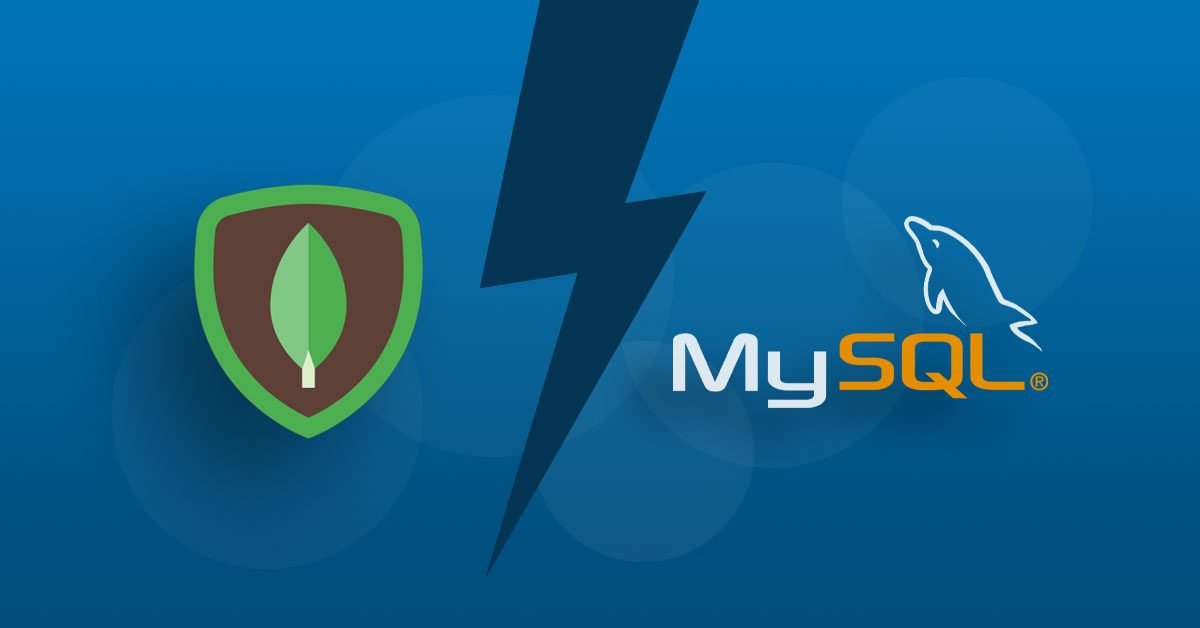MongoDB vs. MySQL – what should you choose?
MySQL was the go-to database management system even a few years back. However, modern non-relational databases like MongoDB are fast becoming popular. Which one makes sense for your business?
Let’s set one thing clear right in the beginning. None of the databases is better than the other. Each one comes with its pros and cons. So, you need to choose a solution based on your needs.
In this blog, we will do a MongoDB vs. MySQL comparison, albeit not in the traditional sense. We will highlight the use cases where each solution shines. You can then choose the right DBMS based on the information.
Let’s begin with the most vital consideration.
Nature of Data
The type of data you deal with regularly will make your choice of databases easy. MongoDB is ideal for unstructured data where you don’t need any specific schema. In fact, any NoSQL DBMS is geared for unrelated data that you can store without much difficulty.
Additionally, MongoDB is suited for disparate and real-time data. Social media platforms or IoT are good use cases of NoSQL databases.
MySQL is ideal for structured and relational data. When you know how your data fits in, MySQL is the way to go. Any traditional or legacy architectures relying on multi-row transactions will benefit from relational databases.
For example, the accounting industry still needs the reliability of MySQL for its operations. Or, a flight booking platform will need the schema-based SQL database as it knows how its data fits in.
Agility
Agile is the new word on the block everyone seems to be picking up. Going agile is considered the way to cut failures, speed up time-to-market, and react to changes faster. Which DBMS will help you adopt agility?
According to experts, NoSQL is the way ahead for agile practices. The platforms were born from the need to go agile and can process huge volumes of data spread across servers. You can also use MongoDB for real-time predictive analysis and exploratory purposes.
MySQL can be seen as a bit rigid when it comes to agility. However, you can’t get past SQL databases if your data is structured or relational. NoSQL databases don’t offer the same advanced functions, without which you may not be able to adopt agility.
Data Accuracy and Integrity
Most MongoDB vs. MySQL comparisons don’t bring up the angle of data integrity. Some industries can’t afford to miss out on this vital quality as their survival depends on it. Any SQL database like MySQL incorporates data integrity by virtue of being a relational database. You can take data accuracy for granted as there is no duplication. Every piece of data is validated across the schema for uncompromising accuracy. You can’t even introduce any unauthorized data to game the system in any way.
Industries like banking depend on the data accuracy and integrity of MySQL. You cannot tolerate any shortcomings or goof-ups, and a huge sum of money and business reputation is at stake. SQL databases work like a blockchain ledger to validate transactions and improve data accuracy.
NoSQL databases don’t have the same level of data integrity. You may find instances of duplication or unauthorized data. However, businesses that use MongoDB may not need the same level of accuracy.
Ease of Scaling
MongoDB is taken as the winner when it comes to scaling. This is because you can scale NoSQL databases horizontally and support almost uncountable users. You don’t need to invest in hardware and can look forward to affordable scaling.
MySQL can, on the other hand, only be scaled vertically. You will need to invest in hardware or rent more computing power if you’re on the cloud. However, not all businesses may find the scaling capabilities of NoSQL databases suitable. Why is that?
MongoDB and other NoSQL databases compromise on some features to accommodate horizontal scaling. Plus, things you can do with MySQL can be laboriously slow on NoSQL databases.
We will discuss more in the next factor.
Speed and Performance
Remember we said MongoDB misses out on some features?
NoSQL databases are slow to perform many tasks MySQL does with ease. Functions like updates, ad hoc queries, and joins are faster on MySQL. The time taken can get so high that performing even a regular task may take a long time. Many things you do on MySQL may not even be possible with MongoDB.
Additionally, the problems tend to get worse as you scale-out NoSQL systems.
Why MongoDB appears fast is because it chooses to compromise speed for features. You may develop an application bypassing all these features and scale very easily. But you will need to restrict yourself to a set of limited functions, which may not be enough for all businesses.
As you can see, scaling with MongoDB may not always work out for businesses. In such cases, you need to rely on good old MySQL.
Data Analysis
MongoDB vs. MySQL – which is best for data analysis?
Analyzing data is becoming a daily part of businesses. Most of it is now automated, but the choice of databases is still important. When should you choose what?
The selection of your DBMS will depend on the nature and amount of your data. Plus, the purpose of your analysis may also be a factor for consideration. For example, MySQL is the go-getter if you are analyzing data to determine your customers’ behavior.
On the contrary, you may prefer NoSQL databases for analyzing social media data. It should also be your choice for geographical data and texts. MongoDB can also handle image processing well and performs like a champ for high-scale text mining.
However, you may need a data scientist to analyze semi-structured data on MongoDB. You won’t be able to handle the job without a background in coding.
MySQL comes with a lower learning curve. Most engineers are familiar with SQL queries and need no additional training. The technology has been around for decades, and you will find enough experts to serve your needs.
Full Text Search
Full text search is a useful function businesses rely on. Full text search helps you locate keywords in a long string of text. Or in other words, it’s like looking for strings within strings. MongoDB does a fair job at full text search as it comes with many indexing options. However, you can’t go too far with partial text searches.
MySQL takes full text search much too seriously. You can use advanced functions to perform your search and even narrow down to the last set of columns. Plus, you have multiple methods of doing full text search, which is not possible in MongoDB.
You can say MySQL gives you more control over your data. It is also adept at giving you quick results when the index is missing or not defined. The system will pinpoint the relevant rows after scanning the entire table. In the case of NoSQL, it will scan every document inside a collection if an index is missing.
Final Thoughts
You can now understand why it is futile to do a MongoDB vs. MySQL comparison without going into fine details. We have tried to provide you the scenarios where one DBMS trumps the other. You can go for MongoDB if your data doesn’t need to follow a fixed schema. NoSQL databases serve ease of scaling, quick querying, and real-time data needs well. They are also the right choice for automation and quick data recoveries.
MySQL is ideal for small businesses that don’t need much scaling. Businesses that want to use structured data should also use relational databases. You can get high reliability and optimum performance with more control over your data. Businesses with high transaction rates and the need for data security can also use MySQL on a low budget.
Always work with a reliable partner to make the right choice and implement your database. Wizard Communications, with its team of expert engineers, is ready to help you grow your business. Get in touch with us today for a professional consultation.





